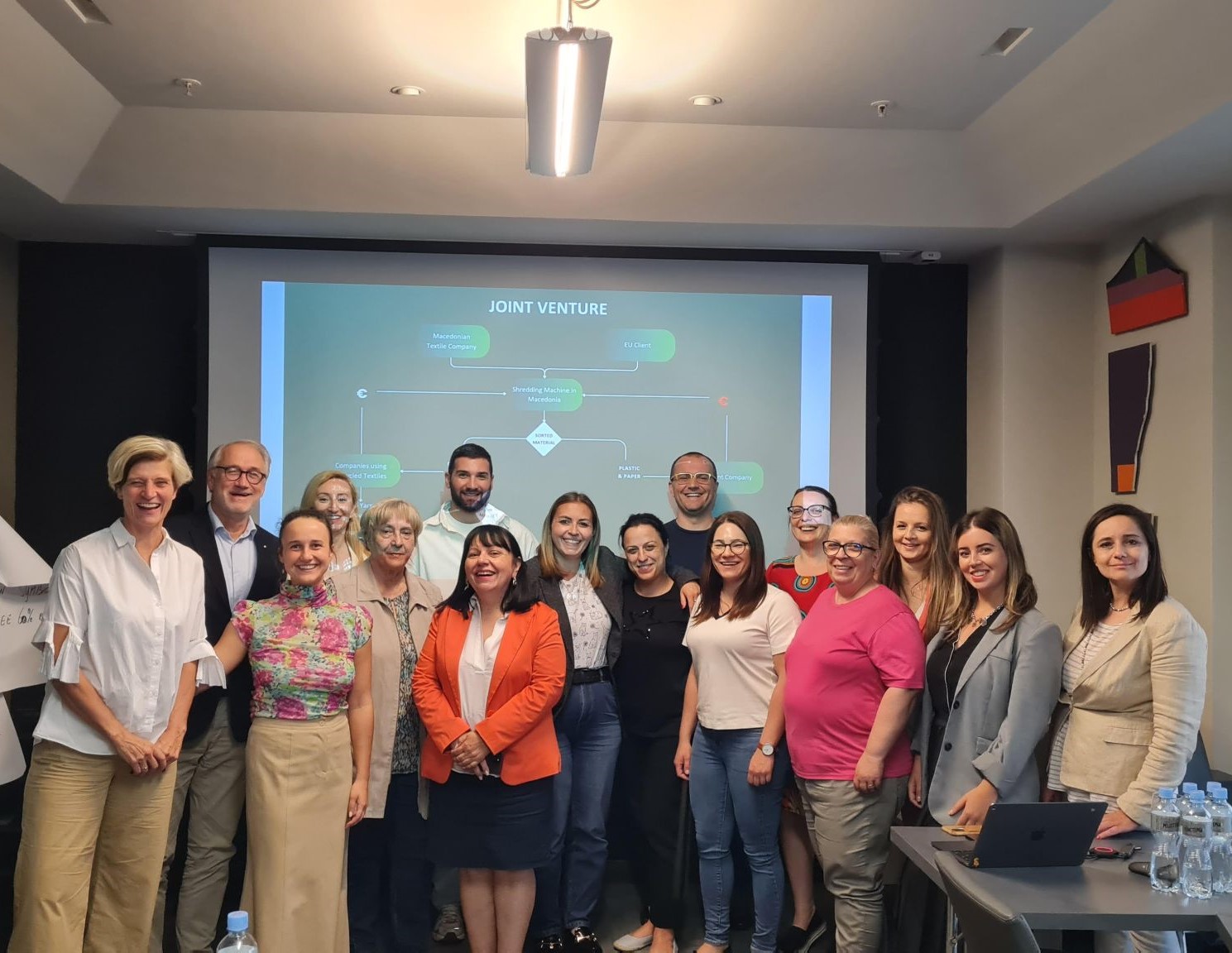Workshops on circular economy in the textile sector in cooperation with SIPPO Macedonia (30/31 May 2024)

Workshops on circular economy in the textile sector in cooperation with SIPPO
Macedonia (30/31 May 2024)
The Textile Cluster in processing with the Swiss Support Programs Swiss Import Promotion Program (SIPPO) implements an activity to support the textile sector to map industrial textile waste in our country with the full disclosure of circular economy solutions.
Within this activity, on May 30, 2024, the Textile Cluster organized its circular business models for improved management of textile waste in our country, which represents one of the key segments for the development of sustainable operations of companies. Circular business models are developed on
on data from the Macedonian textile sector obtained through a questionnaire that was delivered to a member of the cluster, as well as on the basis of several direct meetings with companies from our country.
The event was an interactive session on the challenges with textile waste in Macedonia, the respondents gave contributions in order to understand the current situation with textile waste in Macedonia, a discussion developed about the only research on textile waste in Macedonia and the lecturers were presented to two different businesses models adapted to the current needs and challenges of the sector.
Speakers at the event were Ms. Mastija Dermastia who is the CEO of Anteja ECG, a women-owned and operated consulting company dedicated to enabling sustainable economic development with more than three years of comprehensive experience and Mr. Jaap Zandbergen who has a background in working with various related based on his diverse sales and sourcing experiences in China, Asia, the Middle East, Europe and North America.
In the context of the mentioned SIPPO project whose focus is the exercise of circular business models and improvement of industrial practices through targeted development of capacities and cooperation, the next day 31 May 2024 with special experienced lecturers on these topics was a training only for the composition of the Textile Cluster. An observation made at work
at the cluster levels in supporting members in the field of sustainability and circular economy. The assessment of current practices in the field of circular economy was carried out, new services and models for circular economy economically with sustainable principles were proposed.
As sustainability becomes a condition that will no longer be a subject of negotiation for companies, there is especially one that anticipates the expectations of consumers and regulatory bodies in the EU, the textile sector is faced with the imperative to adapt to change and adjust its preferences for sustainable production. Through this activity, the textile cluster aims to design customized circular economy models, focusing on waste generation, promoting reuse and recycling, and minimizing environmental impact. Furthermore, with
integrating the concepts of the circular economy, businesses will be able to improve their offer on internal markets, improve regulatory requirements, strengthen environmental sustainability.
Macedonia (30/31 May 2024)
The Textile Cluster in processing with the Swiss Support Programs Swiss Import Promotion Program (SIPPO) implements an activity to support the textile sector to map industrial textile waste in our country with the full disclosure of circular economy solutions.
Within this activity, on May 30, 2024, the Textile Cluster organized its circular business models for improved management of textile waste in our country, which represents one of the key segments for the development of sustainable operations of companies. Circular business models are developed on
on data from the Macedonian textile sector obtained through a questionnaire that was delivered to a member of the cluster, as well as on the basis of several direct meetings with companies from our country.
The event was an interactive session on the challenges with textile waste in Macedonia, the respondents gave contributions in order to understand the current situation with textile waste in Macedonia, a discussion developed about the only research on textile waste in Macedonia and the lecturers were presented to two different businesses models adapted to the current needs and challenges of the sector.
Speakers at the event were Ms. Mastija Dermastia who is the CEO of Anteja ECG, a women-owned and operated consulting company dedicated to enabling sustainable economic development with more than three years of comprehensive experience and Mr. Jaap Zandbergen who has a background in working with various related based on his diverse sales and sourcing experiences in China, Asia, the Middle East, Europe and North America.
In the context of the mentioned SIPPO project whose focus is the exercise of circular business models and improvement of industrial practices through targeted development of capacities and cooperation, the next day 31 May 2024 with special experienced lecturers on these topics was a training only for the composition of the Textile Cluster. An observation made at work
at the cluster levels in supporting members in the field of sustainability and circular economy. The assessment of current practices in the field of circular economy was carried out, new services and models for circular economy economically with sustainable principles were proposed.
As sustainability becomes a condition that will no longer be a subject of negotiation for companies, there is especially one that anticipates the expectations of consumers and regulatory bodies in the EU, the textile sector is faced with the imperative to adapt to change and adjust its preferences for sustainable production. Through this activity, the textile cluster aims to design customized circular economy models, focusing on waste generation, promoting reuse and recycling, and minimizing environmental impact. Furthermore, with
integrating the concepts of the circular economy, businesses will be able to improve their offer on internal markets, improve regulatory requirements, strengthen environmental sustainability.
